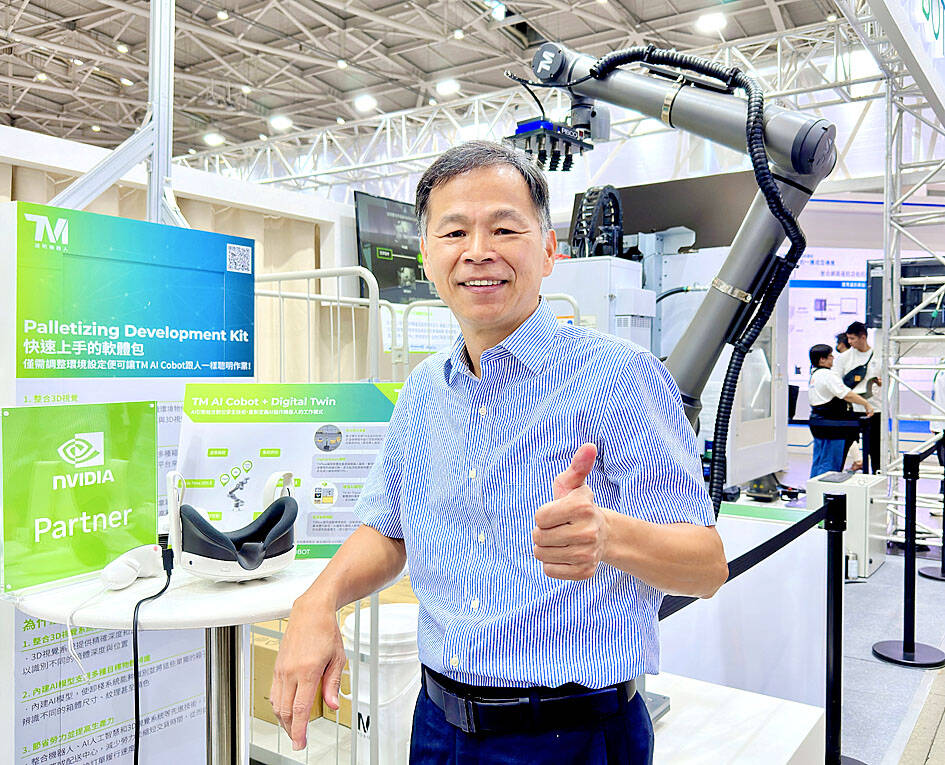Techman Robot Inc (達明機器人), a robotic arm partner of Nvidia Corp, yesterday said it aims to outpace the 20 percent annual growth for the “collaborative robot” (cobot) industry this year, driven primarily from rising demand from southeastern Asia and China.
Techman, a subsidiary of Quanta Computer Inc (廣達電腦), focuses on developing user-friendly robotic systems with integrated vision capabilities. Using artificial intelligence (AI) technologies, Techman’s cobots could recognize the orientation and presence of materials, perform testing and inspection, and dynamically pick and place tasks.
Techman is the world’s No. 2 AI cobot supplier, behind only Odense, Denmark-based Universal Robots. The Taiwanese firm had shipped more than 15,000 AI robots as of September last year.

Photo: Fang Wei-chieh, Taipei Times
“The cobot industry is to grow 20 percent each year. We are targeting more than 20 percent growth this year” in revenue, Techman president Haw Chen (陳尚昊) told reporters on the sidelines of a forum in Taipei.
Techman’s sales posted annual growth of 17.54 percent to NT$1.48 billion (US$45 million) last year from NT$1.26 billion in 2023. The cobot market is expected to expand at an annual compound growth rate of 20.1 percent from this year to 2030, market researcher Mordor Intelligence forecast.
The Asia-Pacific region is to be the growth engine of the company, especially Southeast Asia and China, Chen said.
A majority of Techman’s robotic arms or robotic systems are adopted in industrial automation such as in vehicle manufacturing plants, electronics manufacturers, machinery companies and warehouses, the company said.
The US market is a new growth driver and is expected to see steep growth this year, Chen said.
Last year, Techman set up a warehouse in Indiana to store spare parts in collaboration with its customers and established a hub in El Paso, Texas. The company also has sites in Mexico, along with many other local manufacturers allocating production to the country amid the US-China trade dispute, he said.
Techman does not expect new trade policy from the incoming administration of US president-elect Donald Trump, such as heavy import tariffs, to have adverse impact on its business, Chen said.
“We have to provide on-site services to our customers,” Chen said, adding that the company is following the steps of its customers’ expansion overseas.

Macronix International Co (旺宏), the world’s biggest NOR flash memory supplier, yesterday said it would spend NT$22 billion (US$699.1 million) on capacity expansion this year to increase its production of mid-to-low-density memory chips as the world’s major memorychip suppliers are phasing out the market. The company said its planned capital expenditures are about 11 times higher than the NT$1.8 billion it spent on new facilities and equipment last year. A majority of this year’s outlay would be allocated to step up capacity of multi-level cell (MLC) NAND flash memory chips, which are used in embedded multimedia cards (eMMC), a managed

CULPRITS: Factors that affected the slip included falling global crude oil prices, wait-and-see consumer attitudes due to US tariffs and a different Lunar New Year holiday schedule Taiwan’s retail sales ended a nine-year growth streak last year, slipping 0.2 percent from a year earlier as uncertainty over US tariff policies affected demand for durable goods, data released on Friday by the Ministry of Economic Affairs showed. Last year’s retail sales totaled NT$4.84 trillion (US$153.27 billion), down about NT$9.5 billion, or 0.2 percent, from 2024. Despite the decline, the figure was still the second-highest annual sales total on record. Ministry statistics department deputy head Chen Yu-fang (陳玉芳) said sales of cars, motorcycles and related products, which accounted for 17.4 percent of total retail rales last year, fell NT$68.1 billion, or

In the wake of strong global demand for AI applications, Taiwan’s export-oriented economy accelerated with the composite index of economic indicators flashing the first “red” light in December for one year, indicating the economy is in booming mode, the National Development Council (NDC) said yesterday. Moreover, the index of leading indicators, which gauges the potential state of the economy over the next six months, also moved higher in December amid growing optimism over the outlook, the NDC said. In December, the index of economic indicators rose one point from a month earlier to 38, at the lower end of the “red” light.

MediaTek Inc (聯發科) shares yesterday notched their best two-day rally on record, as investors flock to the Taiwanese chip designer on excitement over its tie-up with Google. The Taipei-listed stock jumped 8.59 percent, capping a two-session surge of 19 percent and closing at a fresh all-time high of NT$1,770. That extended a two-month rally on growing awareness of MediaTek’s work on Google’s tensor processing units (TPUs), which are chips used in artificial intelligence (AI) applications. It also highlights how fund managers faced with single-stock limits on their holding of market titan Taiwan Semiconductor Manufacturing Co (TSMC, 台積電) are diversifying into other AI-related firms.